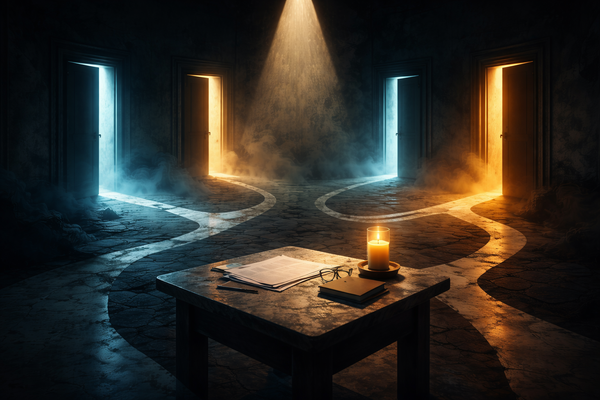How to Take Things Apart (Without Scaring the Neighbors)
On mortuaries, butchery, and why curiosity isn’t the same thing as creepiness

I wasn't really a school person when I was younger, so college didn't make a massive impression on me or anything. But I vividly remember the cadaver lab in anatomy class — the smell of formaldehyde, the hum of the refrigerators, and the way every single person looked like they were rethinking their life choices the second the sheets came off the tables.
As usual, I was the one who wasn't like the others.
While everyone else was trying to breathe through their mouths and pretend they weren’t about to faint, I was absolutely fascinated by everything that was going on. Nothing about the lab was creepy to me. To me, it was a wonderful, intellectually stimulating place that genuinely sparked my curiosity. Being there was like finally seeing the inside of a clock after wondering for years how it ticks.
That first lab class was the day I learned that what most people call “gross” I apparently call “Tuesday.”
The (Perfectly Normal, Thanks) Fascination
I’ve always liked the process of unpacking how things work. Machines, stories, people, God. (Okay, maybe people a little less, because they move around too damn much.) The human body is the ultimate puzzle. Soft, mysterious, beautifully organized chaos. One of the closest things we have to a tangible miracle, really.
Once upon a time, after I knew I wanted nothing more to do with retail but before I started freelance writing, I even briefly flirted with the idea of going into mortuary work. I researched programs, half-seriously imagined myself with a tiny office that smelled faintly of lilies and Lysol... and liked everything about that picture.
In fact, I imagined this so vividly at one point that, somewhere out there, there’s almost certainly a parallel-universe me who did become a mortician and is probably great at it. A calm, slightly goth Mary Poppins of the dead.
But in this reality? The few people I mentioned this to, with the sole exception of Seth, just stared at me like I’d just randomly said I wanted to go to clown college. Pretty much exactly why not that many people know about the whole mortician thing. I get that I don't "look" like the kind of person who'd enjoy working with dead bodies, but damn.

The Butcher, the Mortician, and the Girl with the Notebook
True to form, I also went through a phase where I thought seriously about becoming a butcher.
I have fantasized many times about achieving the whole “knowing where the joints are, wielding a knife like poetry” level of mastery. For example, there's a scene in Game of Thrones where Tywin Lannister breaks down a deer carcass mid-monologue. My whole brain lit up at the time, like, "Hell, yeah. That's competence right there."
Many years ago, during a period of intense freelance copywriting burnout, I even applied for a job working behind a butcher counter, thinking maybe it was time to just switch gears entirely. I didn’t get it (which is probably for the best, because I bruise like a peach and don’t trust myself with a bandsaw). But something about the idea definitely still appeals to me.
And most people didn't understand that, either.
They hear me say words like “butchery” and “mortuary” and think "death wish" or go, "Jesus, what the fuck is wrong with you." But to me, both of these almost-jobs were about respectful transformation. They were about the art of taking something raw or broken and giving it dignity, structure, or purpose.
And honestly? I'm realizing that writing isn’t all that different. The tools just leave fewer stains.

Why It Speaks to Me (and Possibly to Others, Too)
This is the part where I itemize this whole fascination, because I’ve had years to think about it, and I promise it’s not as unhinged as it sounds.
It's about order
The world is messy, and people are so damn unpredictable. Emotions don’t come with diagrams, but anatomy does. I find an incredible amount of comfort in knowing that the heart connects to the lungs, the ribs protect the soft parts, and everything fits exactly where it should.
It's about honesty
Living bodies walk around lying all day like it's their job. They hide behind costumes, performances, personas, and sometimes deliberate misrepresentation. Inanimate bodies that are no longer alive tell the truth, unfiltered and unapologetic.
It's about stillness
As an autistic person, I’m not big on being touched, especially by people I don't know. The chaos of other people’s energy is overwhelming, but the stillness of a lab or a workspace — even the symbolic kind — is peace incarnate. I am free to study without being studied back.
It's about craftsmanship
Morticians and butchers are artisans. They work with respect, patience, and control, and there’s nothing careless about any part of the process. That appeals to me deeply — the ritual of precision and the quiet rhythm of getting things exactly right.
It's about transformation
Both butchering and mortician work are alchemy. One turns death into dignity. The other turns death into dinner. Both of those are acts of care, and art of any kind really does the same thing, in a way. It turns chaos into something you can look at and say, “Ah, yes, I get it now.”
It's about beauty
Not the Instagram kind, but the kind that exists in simple symmetry, form, and truth. The skeleton beneath the skin. The mysterious, beautiful structure that remains even after the story ends.
The Blueprint and the Joke
So often when I share things like this, people tell me, “You have such weird interests." But the truth is, I find this all beautiful because it reminds me that everything around us is made of patterns, even living bodies — muscle, bone, habit, story.
Nothing is random. Ever. Even the parts that feel messy are still held together by a structure you can predict and potentially understand.
And that’s what writing is to me, as well. It is the anatomy of thought. Whether I'm doing it for my clients or for myself, I dissect ideas, find the connective tissue, trim the excess. I’m just as fascinated by what keeps a sentence alive as I am by what keeps a body alive. And when I’m editing, I’m basically doing tiny word autopsies. (Cause of death: adverb overdose.)

The Living Version
I'm middle-aged and very settled into my life as a creative now, but I still have these interests and impulses. I'm just likely to satisfy them in much more mundane ways — pruning plants, cooking dinner, editing drafts. All of those things provide a very similar meditative satisfaction that's about pulling away what doesn’t belong and revealing what does.
Every so often, though, I’ll catch myself halfway through chopping onions or prepping a roast for dinner and think, "This is kind of like mortuary work, just smellier and with fewer formal ethics guidelines."
I suppose all people have their hobbies. Some knit. Others collect Funko Pops. I just happen to still have a part of me that finds peace in anatomy charts and respectful disassembly.
But at the heart of it (no pun intended), what I really love is understanding — seeing how things are built, learning what holds them together, and observing what remains when they come apart.
Some people study the living to understand life. I study the leftovers, the underlying structure, the blueprint, and especially the quiet proof that we were here. And if that makes me a little weird? I suppose, at least I’m the kind of weird that knows where all the parts go.





